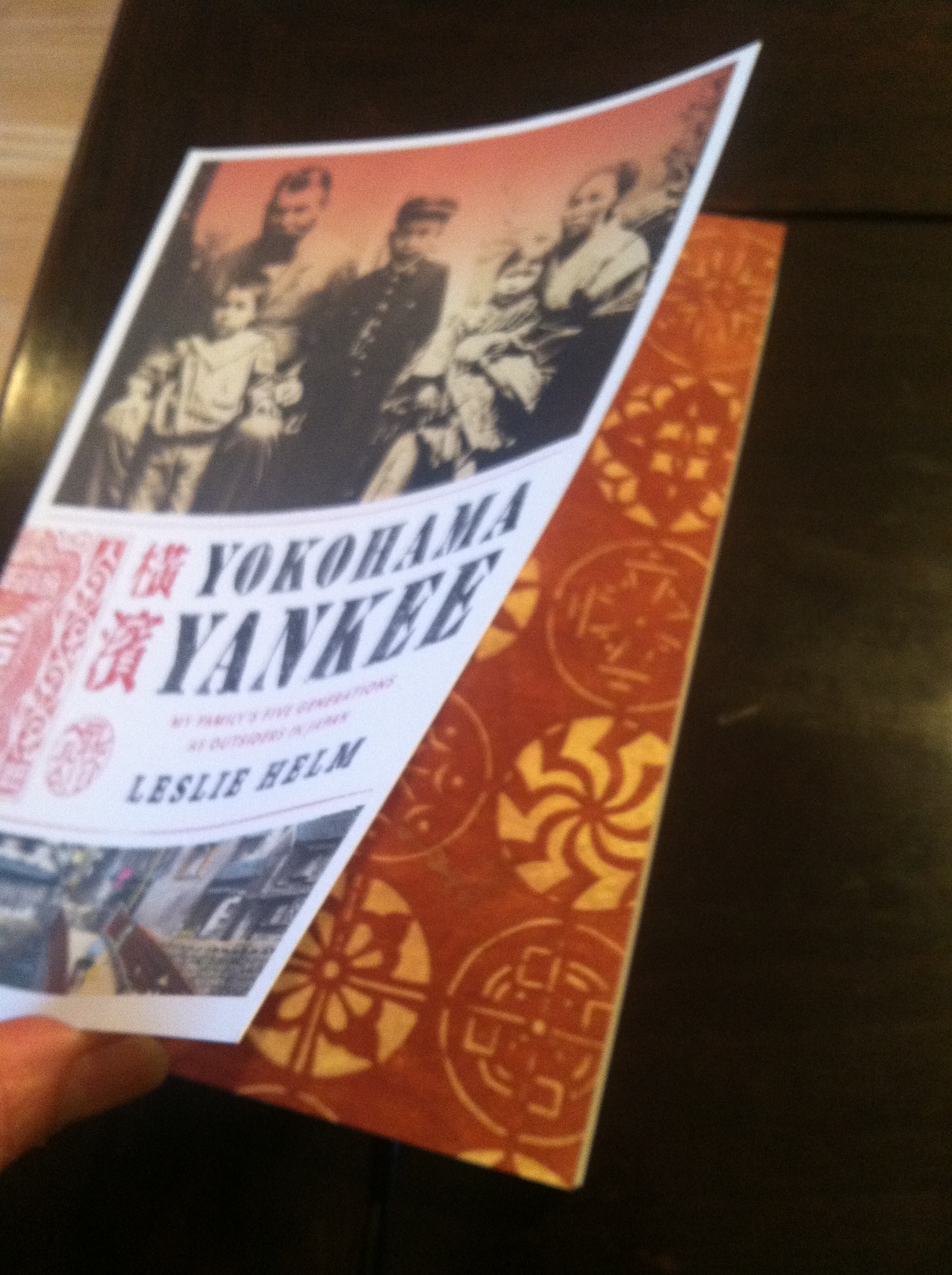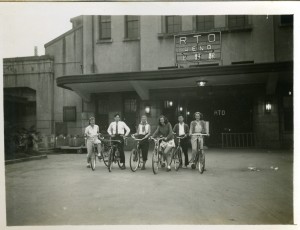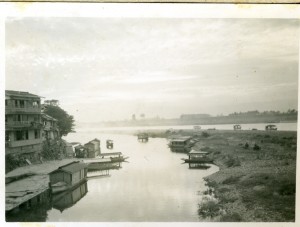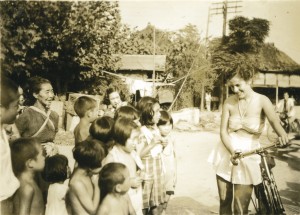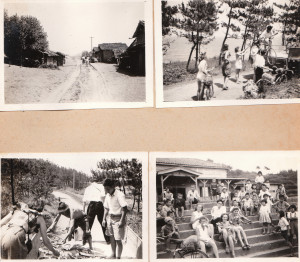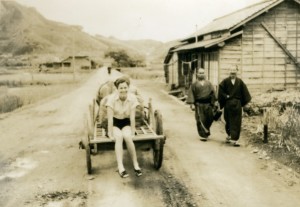This is a passage from my mother’s reminiscences about a unique group to emerged in Japan’s postwar period:
Quite by luck, one of those strange incidents that can change ones life happened. That was the beginning of the Inubashi, a small group of young German, Japanese, and American people. But I will have to begin from the beginning for that story: In one of the women’s billets where non-military female employees of the Armed Forces lived, I think it was called the Osaka Building, there was a room which housed five young women called Carol Chambers (from California), Barbara Vestal (from California), Marjorie Murphy (from Minnesota), Kay Russell (from ?) and Yoshi Nakandakari (from Okinawa).
It all started with Kay Russell, who worked in the Department of Information and Education with, among other people, a Japanese gentleman. This gentleman invited Kay to his home for dinner one day. After dinner photo albums were brought out to show Kay a little about the life of the family. Among many photos were some of two Caucasian children, a boy and a girl. This was interesting to Kay and she asked who these children might be. They are the children of my former teacher was the answer. Kay was curious: Where do they live? When she was told that they were living in Tokyo, she asked whether she could meet them. These children were Roland and I, and Mr. M. (I wish I could remember his name) invited Kay, Roland and me to dinner, so that we could meet. Thus we got to know Kay, and later her roommates Carol and Barbara.
At that time Carol and Barbara were teaching two young students of Tokyo University English: Ken Ikebe and Toshi Muto (both later joined Japan’s foreign service, and Toshi was ambassador to Moscow and London among many other postings – but became the first one of our group to die. Ken was consul general in Seattle at one point, ambassador to New Zealand, and a member of Japan’s UN mission in Paris when Roland, Jane, Don and I visited there in l951.) One day, Kay, Barbara, Carol, Roland and I decided to go on a bicycle trip over the Thanksgiving holiday. The American girls suggested that we include their two Japanese students, and Roland and I decided to ask Keiko Hiratsuka and our friend Horst Schneewind to join us. Everything was quickly arranged – everybody had a bicycle, and the date was set. We decided to meet at Yurakucho station. We never inquired how to get our bicycles on the train: we just took them onto the platform and into the coach. Americans were still able to get away with many things other people couldn’t get away with. Nobody knew that Roland and I were not Americans, and the Japanese students were part of our group. We had decided to bicycle along the coast of the Izu Peninsula. We took the train to Mishima at the base of the peninsula, at the foot of Mt. Fuji. Our first stop was a small inn which we found by chance on the south-eastern coast of the peninsula. It was on a slope and we had to carry our bikes down an incline (were there steps?) and up again the next day. We had army K rations for dinner, augmented by some tangerines given to us by a Japanese gentleman who had the room next to ours. (We gave him some K rations in exchange.) Back on the road the next day we ran into a man who had just shot a pheasant. We offered to buy it from him and Roland carried it slung by a string over his shoulder. That day we made it to Shimoda, a harbor town at the tip of the peninsula. There we had the cook prepare our pheasant which we ate along with our Japanese meal for our Thanksgiving dinner. One of our two rooms at the hotel, I think it was the one for us girls, had the name “Inubashi” above the door. At the inn there was also a room with ping pong tables. Above the door to that room was a sign that read “Ping Ponog Room.” After dinner we decided to play ping pong, and held the “Inubashi International Ping Ponog Tournament.” At Christmas, one of the Japanese young men, Toshi Muto, sent us a card addressed “To the members of the Inubashi International Ping Ponog Tournament.” Thus was born the future name of our group “the Inubashi.” Father soon became the “Oya-Inubashi” (Elder Inubashi), and joined us on many future trips, including a bicycle trip on which someone in our group always had our father on his bike (my father’s eyesight was too poor for him to be able to ride a bike). At one point one of our group, Hans Crome I think, stopped a truck and got a ride for father and his bike.
It was on this, our first trip, that we started singing. Barbara Vestal (who was one of the girls who shared a room at the Osaka Hotel) was a music teacher and taught us many songs, and directed us. Toshi Muto taught us, of all things, a German round. From Shimoda we took a ferry back to the mainland, and everyone on this boat had to perform something (doing this is quite popular among Japanese).
Most people sang something. So this was the first time we sang with an audience, and with that started a tradition. A friend of Carol’s from San Diego, who was working as a civilian for the army, was also very musical and was allowed to play the organ in the Tokyo Mitsukoshi Department Store after hours. The “Inubashi” went to hear him and he soon became a member. Wherever we went, we sang. We sang together, several times for our friends, and once on stage at some Japanese concert or competition. We practiced every week, and when I came back to Japan after marrying Don, they (the remnants of the Inubashi) were still singing together, and I often joined them. I could write endlessly about this period, so much went on all the time, always new and old faces, always new experiences. I have just been reading in my diary again. I had forgotten a great deal; for instance that father had been teaching German to Kay Russell and Doty. Once a week they came to our place for their German lessons and stayed for several hours, having dinner with us.
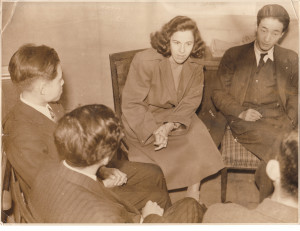 It was at that time that I was teaching both at the Waseda English Speaking Society and at Kawamura Girls’ Middle School. Someone got me a VIP ticket to the trials (where I had worked) and I saw and heard Konoe being interrogated. I also describe a completely new experience for me: watching an American football game. I even went to the horse races for the first time in my life. Another new experience was watching a boxing match and seeing one of the fighters at the end of the match take out of his mouth what I thought were his teeth, but it was his toothguard. I often spent the night with the girls in the Osaka Hotel when I had been out in downtown Tokyo. When many of the Germans in Japan were sent back to Germany by the U.S government, because they had been in the Nazi party , I took over a baby-sitting job from Mrs. Fellmer. She was the wife of a German conductor and musician who had worked and taught in Japan for a number of years. Mrs. Fellmer had babysat for Col. and Mrs. Hammerle’s two children for one year. When the Fellmers left for Germany I took over her job and babysat for about a year until the Hammerles returned to the United States. They lived in Washington Heights, and sometimes I took the children on walks in the grounds of the Meiji Shrine nearby. I liked the whole family and enjoyed very much looking after the children. I learned a great deal about small children. Corky must have been about 3 or 4, and Holly was a toddler, still in diapers. After they left I stayed in touch with them for several years. I wonder where and how they all are now. The parents were quite strict. Once, when I was having lunch alone with the children, Corky said “Lets play house.” I said OK , and Corky banged his fist on the table and said: “God damnit!” I had never thought that Col. Hammerle would use such language, and I had to laugh. I enjoyed my time there. I often had dinner with them and ate so much that I got into the habit of drinking my after-dinner coffee black. I got to take home the bacon drippings which came in very handy for our cooking. As I mentioned, the American authorities decided to send back to Germany all Germans who had been Nazi Party members. Our family friend, Dr. Seckel, a teacher of German at the Kotogakko in Urawa, who had joined the party for practical reasons, was also repatriated. All the possessions of these unfortunate people were confiscated and they were allowed only 350lbs of baggage. Mr. Seckel was an art historian and had an extensive library of lovely art books. All the things confiscated by the Americans were then auctioned off. Mr. Seckel had a brother who was a professor at the University of Chicago who wired money to buy back these books. Mechtild, being married to an American major by then, was able to take part in the auction, so she got back Mr. Seckel’s books for him. Since he was sent back with very little baggage, I assume that my father sent his books to Germany for him. Father wanted very much for Roland and me to go to college, but our Japanese was not good enough to study at a Japanese University, and it would be impossible for us to find a place to live and study in Germany. We discussed these problems with our Inubashi friends, and one of the original four members from the Osaka Hotel, Kay Russell, offered to sponsor Roland. We were happy and grateful to accept her generous offer. The money for the fare came from a Canadian life insurance policy that father had taken out years ago. The insurance company (Sunlife Insurance?) had very thoughtfully continued to make the payments throughout the war from the money that would be due him. Kay Russel’s roommate, Carol Chambers, suggested Roland stay with her family in San Diego, when he first arrived. Roland’s trip and first months in the States are described by Roland elsehwere, I think. What impressed me greatly, however, and what made me certain that Roland could take care of himself, was the following occurrence: Roland’s ship was to go straight to San Francisco, but soon out of Japanese waters he was told that the ship was to stop in Tsingtao, and that he was to pay an additional fare. But Roland argued that he had boarded the ship expecting to go directly to San Francisco and that he had no intention of paying more, and the agency finally agreed not to charge him. I was so proud of Roland when I heard this; now I knew that my little brother could take care of himself. We all missed Roli, but we knew that it was good for him to be in the United States. Now Father and I were alone with Tsunesan. I know my father missed Roland very much. But since he had become a member of the Inubashi, he was never lonely for long, and I was with him till I, too, left about one year later. Since I remember very little of that period I will review what I wrote in my review of the Year 1949. It was a year full of a variety of happenings, interesting, I learned a great deal, and it also brought a lot of fun and many sociable times. A year of enjoyable activities with young people. Group activities of the Inubashi included ski-trips in winter, weekends in Karuizawa at Mrs. SchneewindÕs (mother of a schoolmate of ours), folkdancing, Inubashi parties, swimming, hiking, trips by car in the spring and summer, bicycle tours in the spring and summer, our singing and the creation of the “International Singers.” There were the monthly meetings in which we discussed politics, started by several of us who had taken part in the Quaker International Students’ Conference, and the American Students’ Conference. The latter included the young people who had come from the States as missionaries called the J-3s because of their commitment to stay in Japan for three years. Exciting for me was an invitation to speak in Hibiya Hall for a UNESCO meeting. I spoke briefly in three languages, German, Japanese and English. I went out with many different interesting and not so interesting people, fell madly in love with a young Dane just a few months before my departure from Japan and had to leave with a broken heart.
It was at that time that I was teaching both at the Waseda English Speaking Society and at Kawamura Girls’ Middle School. Someone got me a VIP ticket to the trials (where I had worked) and I saw and heard Konoe being interrogated. I also describe a completely new experience for me: watching an American football game. I even went to the horse races for the first time in my life. Another new experience was watching a boxing match and seeing one of the fighters at the end of the match take out of his mouth what I thought were his teeth, but it was his toothguard. I often spent the night with the girls in the Osaka Hotel when I had been out in downtown Tokyo. When many of the Germans in Japan were sent back to Germany by the U.S government, because they had been in the Nazi party , I took over a baby-sitting job from Mrs. Fellmer. She was the wife of a German conductor and musician who had worked and taught in Japan for a number of years. Mrs. Fellmer had babysat for Col. and Mrs. Hammerle’s two children for one year. When the Fellmers left for Germany I took over her job and babysat for about a year until the Hammerles returned to the United States. They lived in Washington Heights, and sometimes I took the children on walks in the grounds of the Meiji Shrine nearby. I liked the whole family and enjoyed very much looking after the children. I learned a great deal about small children. Corky must have been about 3 or 4, and Holly was a toddler, still in diapers. After they left I stayed in touch with them for several years. I wonder where and how they all are now. The parents were quite strict. Once, when I was having lunch alone with the children, Corky said “Lets play house.” I said OK , and Corky banged his fist on the table and said: “God damnit!” I had never thought that Col. Hammerle would use such language, and I had to laugh. I enjoyed my time there. I often had dinner with them and ate so much that I got into the habit of drinking my after-dinner coffee black. I got to take home the bacon drippings which came in very handy for our cooking. As I mentioned, the American authorities decided to send back to Germany all Germans who had been Nazi Party members. Our family friend, Dr. Seckel, a teacher of German at the Kotogakko in Urawa, who had joined the party for practical reasons, was also repatriated. All the possessions of these unfortunate people were confiscated and they were allowed only 350lbs of baggage. Mr. Seckel was an art historian and had an extensive library of lovely art books. All the things confiscated by the Americans were then auctioned off. Mr. Seckel had a brother who was a professor at the University of Chicago who wired money to buy back these books. Mechtild, being married to an American major by then, was able to take part in the auction, so she got back Mr. Seckel’s books for him. Since he was sent back with very little baggage, I assume that my father sent his books to Germany for him. Father wanted very much for Roland and me to go to college, but our Japanese was not good enough to study at a Japanese University, and it would be impossible for us to find a place to live and study in Germany. We discussed these problems with our Inubashi friends, and one of the original four members from the Osaka Hotel, Kay Russell, offered to sponsor Roland. We were happy and grateful to accept her generous offer. The money for the fare came from a Canadian life insurance policy that father had taken out years ago. The insurance company (Sunlife Insurance?) had very thoughtfully continued to make the payments throughout the war from the money that would be due him. Kay Russel’s roommate, Carol Chambers, suggested Roland stay with her family in San Diego, when he first arrived. Roland’s trip and first months in the States are described by Roland elsehwere, I think. What impressed me greatly, however, and what made me certain that Roland could take care of himself, was the following occurrence: Roland’s ship was to go straight to San Francisco, but soon out of Japanese waters he was told that the ship was to stop in Tsingtao, and that he was to pay an additional fare. But Roland argued that he had boarded the ship expecting to go directly to San Francisco and that he had no intention of paying more, and the agency finally agreed not to charge him. I was so proud of Roland when I heard this; now I knew that my little brother could take care of himself. We all missed Roli, but we knew that it was good for him to be in the United States. Now Father and I were alone with Tsunesan. I know my father missed Roland very much. But since he had become a member of the Inubashi, he was never lonely for long, and I was with him till I, too, left about one year later. Since I remember very little of that period I will review what I wrote in my review of the Year 1949. It was a year full of a variety of happenings, interesting, I learned a great deal, and it also brought a lot of fun and many sociable times. A year of enjoyable activities with young people. Group activities of the Inubashi included ski-trips in winter, weekends in Karuizawa at Mrs. SchneewindÕs (mother of a schoolmate of ours), folkdancing, Inubashi parties, swimming, hiking, trips by car in the spring and summer, bicycle tours in the spring and summer, our singing and the creation of the “International Singers.” There were the monthly meetings in which we discussed politics, started by several of us who had taken part in the Quaker International Students’ Conference, and the American Students’ Conference. The latter included the young people who had come from the States as missionaries called the J-3s because of their commitment to stay in Japan for three years. Exciting for me was an invitation to speak in Hibiya Hall for a UNESCO meeting. I spoke briefly in three languages, German, Japanese and English. I went out with many different interesting and not so interesting people, fell madly in love with a young Dane just a few months before my departure from Japan and had to leave with a broken heart.
